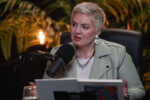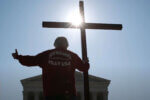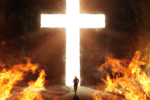Many church leaders frowned after a West Virginia Pentecostal took home millions in December
When a Church of God (Cleveland, Tenn.) member in West Virginia won a $314.9 million Powerball jackpot, tithing his winnings stirred controversy. Suddenly congregations nationwide were asking themselves if they would accept such donations.
In the face of gambling’s growth, this is no longer an academic question. Andrew Whittaker Jr. took the cash option and went home in December with $170.5 million, topping a list of 10 Powerball jackpots in 2002 that paid out more than $469 million, the Multi-State Lottery Association reported. Elsewhere, Tennessee and North Dakota had approved lottery initiatives in November, leaving Utah and Hawaii as the only states without some form of legalized gambling.
Many denominations frown on lotteries, including the Church of God. During its last general assembly, delegates affirmed their opposition to gambling.
But Whittaker’s announcement that he would give more than $10 million to his church and other charitable causes sparked two dozen inquiries about the Church of God’s policy. That prompted the International Executive Committee to issue a statement encouraging members to refrain from gambling. However, the committee noted that accepting financial contributions is up to the discretion of the local pastor and congregation.
Despite national anti-gambling policies, the same local option is practiced in the Assemblies of God, the nation’s two largest Protestant bodies–the Southern Baptist Convention (SBC) and the United Methodist Church–and The Salvation Army.
Exercising its right of choice, the pastor of Whittaker’s church said it might build a youth worship center with its windfall. Pastor C.T. Matthews of Tabernacle of Praise didn’t respond to Charisma’s request for an interview. But earlier he told The Charlotte Observer, “All things belong to God.”
Some groups disagree. A Salvation Army chapter in Naples, Fla., returned a $100,000 donation last December to a man who won $14.2 million in Florida’s lottery. A spokeswoman for Maj. Cleo Damon said since the group preaches against gambling, accepting donations from lottery winnings would be talking “out of both sides of our mouth.”
Lt. Col. Tom Jones, The Salvation Army’s national development director in Washington, D.C., said Damon’s decision affected only his area because all fund raising is done on a local basis. However, Jones said the action reflects the international group’s stand, since officers must affirm opposition to smoking, drinking, cursing and gambling.
The dichotomy between the cases illustrates what ethics professor David Gushee calls an ambivalence toward lotteries. During Tennessee’s recent referendum, Gushee learned that many Christians don’t see anything wrong with them. “They are not convinced by the moral arguments that church leaders like myself are making,” said the Union University professor. “They see the lottery as a harmless amusement.”
The author of a forthcoming book on Christian liberty wrestled with whether believers have the freedom to participate in lotteries if they aren’t risking large sums or damaging their families. In the end, Rex Rogers decided lotteries violate God’s law, a belief that he says lines up with 500 years of church history. The president of Cornerstone University in Grand Rapids, Mich., Rogers also foresees a repeat of secular history like the tide against lotteries Louisiana stirred in 1890.
“The graft, greed and corruption there was so bad it caused a national outcry,” said Rogers, who previously wrote a book on the dangers of gambling. “Thirty-six states outlawed lotteries in their constitutions. Now it’s gone mainstream again. Eventually there will come an outcry.”
Gerald Farshey, a retired ethics professor who taught for 28 years in Chicago’s city colleges, said the people he sees routinely buying lottery tickets don’t look affluent. “For us to take that money and put it into the church’s activities seems to be robbing those who can’t afford it,” said the former United Methodist minister. “For us to profit from human misery isn’t good.”
But churches that don’t expect to face this sticky question may ultimately be surprised, forcing them to draw a fine line. That’s why Barrett Duke, vice president of the SBC’s ethics commission, advises his denomination’s congregations to adopt a policy before the temptation to take “blood money” arises.
“For a church to receive profits from lotteries is facilitating the activity by lending legitimacy to it,” Duke said.
Ken Walker






Leave a Comment
You must be logged in to post a comment.